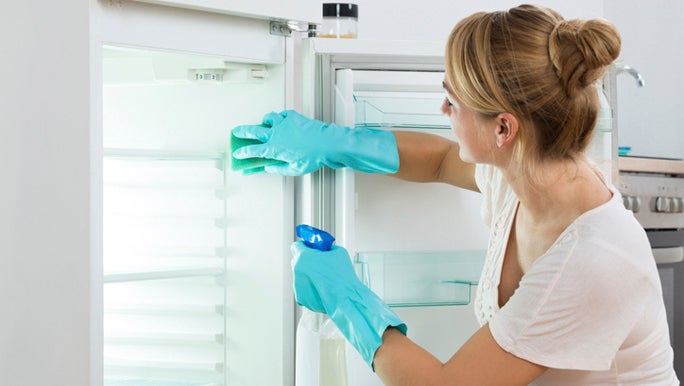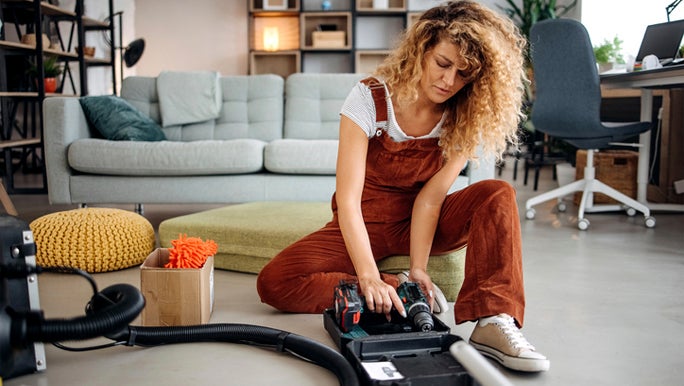Key Points
- Deep cleaning manages microbes that build up over time.
- Dust, bacteria and mould in the home can pose a risk to our health.
- How often you should deep clean varies between households.
In today’s world, we spend more time at home than ever before – living, working and building memories with our loved ones, along with our fur babies and plant babies. The trade-off for spending less time on the go is that our houses may not be as clean as they used to be. Sound familiar?
Like a good night of sleep, deep cleaning can help you hit the reset button on life and turn your living space into a happier and healthier place. So if you’re ready to tackle the grime and bring some sparkle back into your space, this guide is for you.
What is deep cleaning?
True to its name, deep cleaning goes beyond surface-level sweeping and tidying to address the dust, bacteria and mould that can build up over time and pose a potential risk to our health.
Not all bacteria, viruses and fungi that accumulate in the home are harmful, but some contaminants that are commonly found in the home may contribute to illness and disease, including:
- harmful chemicals and metals that settle in dust
- mould that can flourish in damp areas
- bacteria, like staphylococcus, that can settle on surfaces and in food
A thorough deep clean can prevent the spread of germs in your home and also reduce the number of dust mites taking up residence in your bedding, carpet, rugs and furniture. So while we may not all love the idea of a deep clean, many of us would probably enjoy giving those dust mites the boot.
What is deep cleaning vs. cleaning?
Everyday cleaning is more of a spruce-up than deep cleaning.
It’s wiping benches versus scrubbing down the entire kitchen and organising your pantry. It’s dusting the shutters versus wiping them down and methodically cleaning the sills. It’s cleaning a sticky spot in the fridge versus disinfecting every shelf and drawer before meticulously wiping each seal. You get the picture.

Before you begin to deep clean your house, write a to-do list and work your way through it
How to deep clean your house
Deep cleaning isn’t a subject taught at school, so unless a family member or your BFF has let you in on their mystical, age-old secrets, these basic tips can help to get you started.
Make a plan
Start by deciding which areas of your house need the most attention. Some may be more neglected than others, so you may want to start with those first (or save the worst for last – your call). If a list motivates you, jot down your to-do items on paper, and work through them one by one.
Declutter
Whether you’re cleaning out the fridge or sprucing up the bathroom, it’s important to declutter your house before you begin cleaning. Clearing out things that don’t belong in the space makes your job easier, and studies show it can also free up space in your mind.
Get your kit on
Carrying out a deep clean requires a bunch of useful products and equipment, not to mention the right attire. Dress in your go-to cleaning gear, or choose clothes you’ll be happy to throw away. There’s nothing like bleach stains on your favourite jeans to snuff out the success of a deep cleaning spree.
Work top to bottom
Just like cleaning a car, it’s best to work from top to bottom so that dust and dirt fall as you clean.
Dust and wipe hard surfaces using a microfibre cloth, and disinfect wet and high-traffic areas (AKA toilet seats) with your choice of household cleaning products.
Tackle softer surfaces like carpets, floors, curtains and furnishings using a vacuum and a suitable upholstery cleaner or baking soda mix. And don’t forget to switch up your vacuum attachments for those hard-to-reach places.
Mind your appliances
Just because something is out of sight and out of mind doesn’t mean it’s safe. According to the NSW Fire Brigade, almost half of all home fires start in the kitchen.
Dirty grills, ovens and rangehoods may trigger a house fire, so put them on the top of your deep cleaning to-do list, or call a professional.
Don't forget your linen
We spend half of our lives sleeping, so it stands to reason that our beds might get a little manky.
Shedding skin, sweat and a smorgasbord of bodily fluids may create a cosy breeding ground for bacteria, so regularly cleaning linen is essential for our health and wellbeing. Wash mattress protectors, covers, sheets, doonas and pillows regularly in hot water, and ensure they’re fully dry before using them again.

Your fridge can house a lot of bacteria so give it a deep clean on a regular basis
How often should a house be deep cleaned?
The need to deep clean is subjective and depends on how often you use spaces and who you share them with. Share houses and large families with kids and pets can create a messy house and more grime than a single-person household, so there’s no one-size-fits-all answer.
The general consensus is that you should get down and dirty with certain areas of your home more often than others.
- Clean your bathroom at least once per week. Maintaining weekly cleans can stretch out the time between deep cleans, which may be required to clean grout, silicone and mildew.
- Wipe down your kitchen benches and sinks daily, and deep clean your oven, range hood, microwave, dishwasher and other appliances once per month or bi-monthly, depending on usage.
- Household fridges can house a lot of bacteria – up to 7,850 units per square centimetre on average! That’s why throwing away old food and cleaning up spills regularly is important.
- It's a good idea to tidy your living areas daily, vacuum once a week and deep clean the carpets, rugs, couches and curtains regularly to keep dust mites at bay.
- Experienced cleaners suggest tidying your bedroom daily, dusting and vacuuming weekly and deep cleaning a few times per year to keep windows, curtains and wardrobes clean.
What products and equipment do you need to deep clean your house?
When it comes to deep cleaning your home, having the right tools and equipment can make a huge difference.
While there are a plethora of cleaning gadgets and products out there to keep people curious, our deep clean checklist is broadly divided into two simple categories – must-haves and nice-to-haves.
Deep cleaning house checklist: what you really need vs. what you don’t
Must-have items will help you get the job done efficiently, and they include items you most likely have lying around the house. Think of:
- a basic vacuum cleaner
- a handful of microfibre cleaning cloths
- a multi-purpose surface cleaner, like Simply Clean Lemon Myrtle Spray & Wipe
- a floor cleaning solution, as simple as hot water and vinegar/eucalyptus
- a scrubbing brush and an old toothbrush
Nice-to-have items are often a luxury that can speed up cleaning times and spark joy for certain tasks. Think of:
- a high-end vacuum cleaner with all the bits and bobs
- an automatic robot vacuum
- a handheld or combination steam cleaner
- area-specific cleaning products, like bathroom and kitchen sprays
- upmarket cleaning cloths, like the White Magic Eco Micro Fibre Kitchen Cloth
- insect control products
- an air purifier and damp control crystals
- specialised mould removers, like the Sans-Air Surface Mould Remover
The good news is that you don’t need harsh cleaning products or chemicals to achieve a deep clean, which is something to consider if you have small children or people with allergies and sensitivities in your home.

You don’t need to use harsh chemicals to achieve a deep clean
Spending more time at home means our living spaces are potentially getting messier and grimier than ever before. Investing time in regular deep cleaning will not only restore sparkle to your home, but it can also boost your physical and mental wellbeing.
And while the hardest part is often getting started, once you do, the feeling of accomplishment will be well worth your time.
Related:
Reviewed by the healthylife health experts May 2023.



